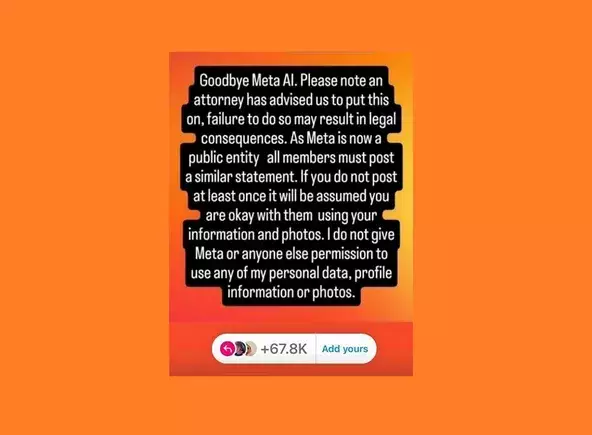In our technologically advanced world, we find ourselves constantly bombarded with information from countless sources, particularly through social media platforms. As convenient as these platforms may be for staying connected and sharing updates, they also serve as fertile ground for the proliferation of misinformation. One of the most striking examples of this phenomenon involves a misguided belief that merely posting a statement or sharing a story can serve as a legitimate legal declaration. This notion is not only misleading but also highlights a broader issue of ill-informed internet behavior that requires critical attention.
Many users on social media platforms have taken to posting vague messages declaring that they oppose a company’s use of their publicly shared content, often spurred by celebrity endorsements. These posts are akin to a digital shout into the void—loud but ultimately ineffective. It’s crucial to recognize that a passive act of sharing, devoid of any substantial knowledge or foundation, does not equate to a proactive stance against the misuse of personal data. Instead, it merely perpetuates a cycle where misinformation is consumed without critical analysis.
The fervor surrounding these posts often stems from an announcement made by Meta about utilizing user-generated content to train its AI models. Despite users having agreed to the terms of service that explicitly state this usage, disillusioned individuals continue to share these unfounded objections. This behavior reveals an alarming trend: many individuals prefer to react emotionally rather than engage intellectually with the nuanced realities of technology and its legal implications.
It’s not enough to simply express outrage or discontent on social media. It’s essential to understand the legal landscape surrounding privacy rights and data usage. For instance, users in the European Union do have a formidable recourse through the “Right to Object.” This legal mechanism allows EU residents to refuse the processing of their data for specific purposes, including AI training, thereby demonstrating a concrete example of how individuals can take rightful action regarding their privacy.
However, for most others around the world, such options may not currently exist. The responsibility lies with users to familiarize themselves with the legalities of their agreements when signing up for services. A deep dive into user agreements can illuminate accepted terms, including how data may be employed or shared with third parties. Therefore, rather than broadcasting vague refusals through social media, individuals should focus on understanding and navigating the legal frameworks that govern their digital footprints.
Participation in what can be termed as “engagement theater”—the act of posting superficial declarations to create the illusion of activism—comes with risks. Not only does it fail to enact real change, but it can also make individuals susceptible to malicious actors who may identify them as potential targets for scams. When the internet is littered with empty claims and emotional responses rather than factual understanding, it opens pathways for exploitation.
Moreover, the way social media fosters quick-hit content is detrimental to meaningful political and legal discourse. The notion that a tweet or a post can encapsulate complex issues is a fallacy. Rapid consumption of bite-sized information can lead to hasty conclusions without a thorough vetting of the facts. In a society where pressing matters often require deep understanding and nuanced dialogue, the limitations of social media become painfully evident.
So, what should one do instead of repackaging legal misinformation into social media posts? The answer lies in taking personal responsibility for one’s knowledge base. Rather than relying on fleeting posts for information, users can leverage the internet’s vast resources to educate themselves on copyright laws, data protections, and their rights as consumers. Engaging with substantive material, such as expert analyses or relevant legal texts, equips individuals with the tools needed to navigate their digital lives proactively and effectively.
Ultimately, education and engagement should replace the fleeting theatrics of social media outrage. By prioritizing informed understanding of the issues at hand, users can not only protect themselves but also contribute to a more knowledgeable public discourse around technology and its implications. In this age of information overload, transforming superficial reactions into informed actions is critical for meaningful engagement in our digital society.

